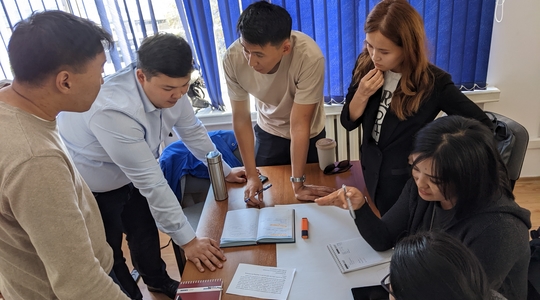The simulation game Kalabia addresses the complex challenges of devel-oping a long-term strategy for climate change adaptation through inclu-sive decision making. During the simulation game, participants discuss three key issues concerning the country's future development in terms of climate change and adaptation measurements: Energy security, agricul-ture, and social justice. The simulation game's goal is to create a long-term vision for Kalabia that will ensure economic progress, social justice, and appropriate adaptation measures to the country's impact from cli-mate change.
Scenario & Procedure
The scenario takes place in the fictitious country of Kalabia, which is expe-riencing unprecedented climate change effects on key sectors such as ag-riculture, the economy, energy production, the private sector, and the gen-eral population. The current president of Kalabia invites key stakeholders to a joint discussion on the many challenges posed by climate change, with the goal of developing a common strategy for adaptation measures that address three key areas: energy security, agriculture and social justice. Participants take on the roles of state and non-state actors, including busi-ness and civil society representatives. As a result, they become familiar with the existing positions and interests. During the negotiation rounds, participants attempt to find common ground in order to reach a broad agreement among key stakeholders from the political, civil society, and business spheres that, in the best-case scenario, will also outlast future changes in the political landscape.
Objectives
Participants will get an insight into contemporary debates concerning the complexity of climate change negotiations between different groups of interest. They will gain a better understanding of how climate change im-pacts conflict dynamics and what strategies are being considered to con-tribute to climate change adaptation measurements. Aside from that, participants will learn more about how national-level negotiation pro-cesses work and how to improve their negotiation skills for finding com-mon ground.
Learning Goals
- Develop a better understanding of the interrelation between different areas affected by climate change on a national level.
- Get an insight into the decision-making provess in the context of climate change policy negotiations.
- Leaning to deal with varying national interests and get a deeper understanding of the key areas: Energy, Agriculture and Social Justice.


